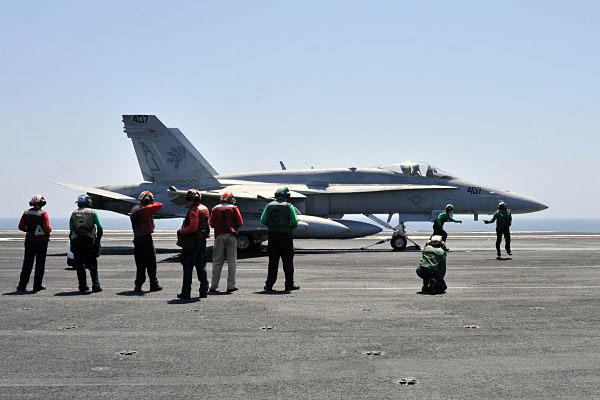U.S. warplanes have been bombing militant vehicles and positions in northern Iraq since Aug. 8, including nine airstrikes Saturday and 14 Sunday, but the Pentagon has yet to come up with a name for the operation.
"I don't have a good reason for why there isn't a name and, frankly, I'm not so sure that that's relevant," Rear Adm. John Kirby, the Pentagon press secretary said last week.
The Pentagon has a computer system to keep track of the thousands of names given to operations and exercises to avoid duplications. The authority to create the names is spread across 24 Defense Department agencies and commands, but Kirby suggested that what is happening in Iraq now could be a no-name operation indefinitely.
Kirby said the current efforts of the troops in Iraq were well known.
"It doesn't matter if it has a name or not. Nobody's worried about what kind of patch they're going to wear on their uniform as a result of this," Kirby said.
Leaving the operation nameless would be a break with a U.S. military tradition stretching back to World War II. Since then, the military has devoted much time and effort at the highest levels to coming up with names for operations to boost troop morale while demonstrating resolve and purpose to the public.
Background material provided by the Pentagon, including an article in Parameters, the quarterly publication of the U.S. Army War College, showed the public relations importance attached to the naming process by the military.
Maj. Gen. Charles McClain, the Army's former public affairs chief, wrote that "the perception of an operation can be as important to success as the execution of that operation."
The material cited an anecdote involving Army Lt. Gen. Thomas Kelly, then the operations chief of the Joint Staff, who got a concerned phone call from his boss about the nickname that had been chosen for the invasion of Panama to topple dictator Manuel Noriega in 1989.
Kelly was asked: "Do you want your grandchildren to say you were in 'Blue Spoon'?" The Panama action was quickly named "Operation Just Cause."
After much deliberation, the wars in Iraq and Afghanistan became "Operation Iraqi Freedom" and "Operation Enduring Freedom," and those operations generated hundreds of subsets of operational names for particular engagements. In Iraq alone, there were more than 500 named operations.
The Pentagon traced the use of nicknames for operations to the German military in World War I, and said that the U.S. military picked up the practice in World War II from British Prime Minister Winston Churchill, who personally selected names for major operations.
Churchill went so far as to object to names chosen by the Americans that he thought were inappropriate. He thought that the American choice of "Soapsuds" was wrong for a planned U.S. bombing raid on Romanian oil fields in Ploesti "in which so many brave Americans would risk or lose their lives." The name was changed to "Tidal Wave."
Churchill also intervened in the naming of the most famous allied operation of World War II -- the D-Day invasion of Normandy. The original name was "Roundhammer." Churchill changed it to the now legendary "Overlord."
One of the quickest about-faces on an operational name came shortly after the terrorist attacks on Sept. 11, 2001. The original name for the invasion of Afghanistan was "Infinite Justice," but there were complaints that the name suggested the military was assuming the role of God.
Then-Defense Secretary Donald Rumsfeld later announced that the military's actions in Afghanistan would be called "Operation Enduring Freedom."
-- Richard Sisk can be reached at Richard.Sisk@monster.com.






























